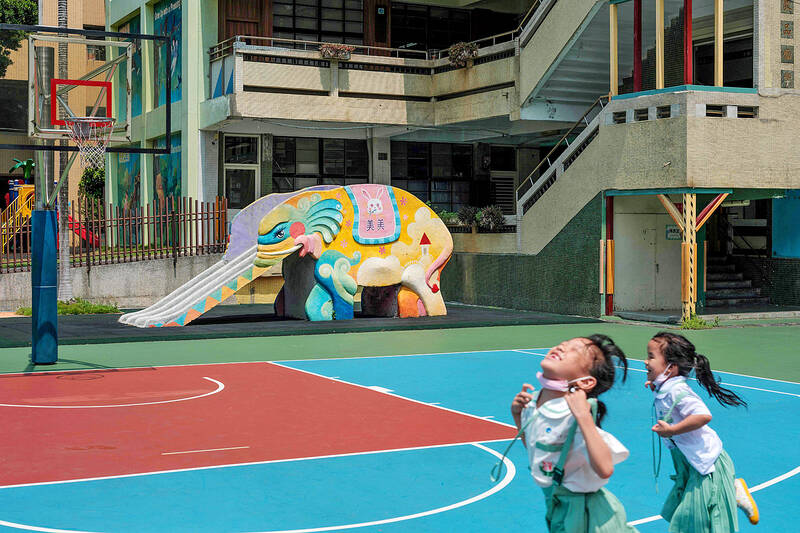In playgrounds across Taiwan, a jumbo surprise awaits children in the form of colorful elephant slides, evoking nostalgia for older Taiwanese, who say the structures used to be ubiquitous across the nation.
Affectionately known as “Grandpa Elephant,” the slides are primarily made of terrazzo or concrete and were once a regular schoolyard feature during the 1960s and 1970s.
However, their sightings have dwindled since the nation tightened playground safety regulations, with some slides removed, while others are off-limits to children.

Photo: Yan ZHAO, AFP
“The elephant slide is like a friend who grew up with us,” said Yu Chiu-ling (尤秋玲), 58, who has been documenting the remaining structures since 2010.
Yu, a writer, said the idea for the project was ignited by a visit to her old elementary school in Changhua County’s Lukang Township (鹿港) where the sight of the elephant slide sparked intense nostalgia in her.
“Many things had changed except the elephant. It’s still round and chubby, and it hasn’t aged, it’s well-preserved,” Yu told reporters. “It was quite emotional to see it again, it felt like it had been waiting for me.”
Yu thought others her age would have similar feelings so she began visiting schools across Taiwan to record the remaining elephant slides, sharing photographs, stories and their locations on Facebook.
“The elephant slide is a memory shared across generations of Taiwanese, who find resonance in it,” she said.
Her Facebook group, “Find our Elephant Friends (slides),” has become a gathering place for those with fond memories of their childhood slides, with members sharing locations and stories of the ones they rediscovered.
Some of the slides have colorful tiles, others fantastical scenes painted on them, and a few rare ones resemble a real elephant — although all feature a wide trunk that doubles as a slide.
The origin of the elephant slide remains unclear. Most believe it was chosen as a playground staple because an elephant trunk was ideal for children to glide down. Some have suggested it was inspired by Taiwan’s beloved Lin Wang (林旺), an Asian elephant born in 1917.
Lin Wang was captured by Chinese troops from Japanese forces in Myanmar during World War II. He was transported to Taiwan in 1947 and died in 2003 at Taipei Zoo at the age of 86.
Most of the slides still standing today have slogans on them reflecting the era of their creation.
Older ones feature phrases like: “Strengthen your body to build the country” and “Love our country” — evoking a sense of patriotism that Taiwan’s then Chinese Nationalist Party (KMT) government wanted to foster after fleeing China for Taiwan.
Newer structures say “beauty” and “liveliness.”
Between 400 and 450 slides remain, said Hsiu Pi-cheng, a Taiwanese designer who has traversed the nation to photograph the slides and pinned their locations on an online map.
However, many schools have sealed off the slides, transforming them into art installations instead.
“I hope they can be preserved and continue to create happy memories for children,” Yu said.

Alain Robert, known as the "French Spider-Man," praised Alex Honnold as exceptionally well-prepared after the US climber completed a free solo ascent of Taipei 101 yesterday. Robert said Honnold's ascent of the 508m-tall skyscraper in just more than one-and-a-half hours without using safety ropes or equipment was a remarkable achievement. "This is my life," he said in an interview conducted in French, adding that he liked the feeling of being "on the edge of danger." The 63-year-old Frenchman climbed Taipei 101 using ropes in December 2004, taking about four hours to reach the top. On a one-to-10 scale of difficulty, Robert said Taipei 101

Nipah virus infection is to be officially listed as a category 5 notifiable infectious disease in Taiwan in March, while clinical treatment guidelines are being formulated, the Centers for Disease Control (CDC) said yesterday. With Nipah infections being reported in other countries and considering its relatively high fatality rate, the centers on Jan. 16 announced that it would be listed as a notifiable infectious disease to bolster the nation’s systematic early warning system and increase public awareness, the CDC said. Bangladesh reported four fatal cases last year in separate districts, with three linked to raw date palm sap consumption, CDC Epidemic Intelligence

US climber Alex Honnold left Taiwan this morning a day after completing a free-solo ascent of Taipei 101, a feat that drew cheers from onlookers and gained widespread international attention. Honnold yesterday scaled the 101-story skyscraper without a rope or safety harness. The climb — the highest urban free-solo ascent ever attempted — took just more than 90 minutes and was streamed live on Netflix. It was covered by major international news outlets including CNN, the New York Times, the Guardian and the Wall Street Journal. As Honnold prepared to leave Taiwan today, he attracted a crowd when he and his wife, Sanni,

Taiwanese and US defense groups are collaborating to introduce deployable, semi-autonomous manufacturing systems for drones and components in a boost to the nation’s supply chain resilience. Taiwan’s G-Tech Optroelectronics Corp subsidiary GTOC and the US’ Aerkomm Inc on Friday announced an agreement with fellow US-based Firestorm Lab to adopt the latter’s xCell, a technology featuring 3D printers fitted in 6.1m container units. The systems enable aerial platforms and parts to be produced in high volumes from dispersed nodes capable of rapid redeployment, to minimize the risk of enemy strikes and to meet field requirements, they said. Firestorm chief technology officer Ian Muceus said